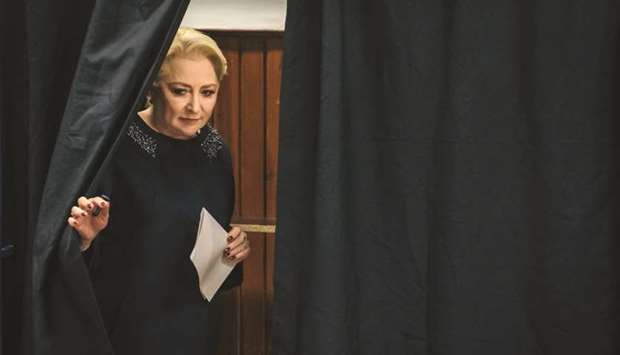Romanians voted yesterday in the second round of presidential elections that are expected to return incumbent Klaus Iohannis to office, confirming the pro-European trajectory of the eastern EU member state.
Thirty years after the fall of communism, the centre-right former physics professor is running against Social Democrats (PSD) leader and former prime minister Viorica Dancila, whose government collapsed last month in a no-confidence vote.
“It’s a choice for the well-being of Romania. We’re waiting for a revolution, for things to get better. But we are waiting for this, and nothing comes our way,” Stan Mihai, a 76-year-old pensioner who voted in the capital Bucharest, told AFP.
In the first round of voting on November 10, Iohannis won 38% of the vote, ahead of 13 other candidates.
Dancila came second with 22%.
Analysts say that voters who backed lower-placed candidates can be expected to largely swing behind Iohannis, amid deep resentment toward the PSD over controversial judicial reforms.
“I voted for a Romania that is modern, European and normal,” Iohannis told reporters after casting his ballot yesterday.
A total of 18.2mn Romanians are eligible to vote with turnout at close to 50% two hours before polls closed.
A record 650,000 voters are abroad – part of a 4mn strong diaspora who have emigrated in search for better paying jobs – and tending to favour liberal candidates.
The PSD government had engaged in a long battle with the European Union, and Iohannis who backed Brussels, over allegations it was trying to push through measures to neuter the judiciary and benefit PSD politicians.
The left-wing party, which is seen as the successor of the ruling elite before the overthrow of communism in 1989 and has dominated politics since, has been accused of widespread corruption.
And while nationalism has been less present in Romanian politics than elsewhere in the region – such as in Hungary or Poland – the PSD tried to frame its clashes with EU institutions as evidence that it was standing up for Romania.
“I voted for a presidential mandate where we see more involvement and respect for the Romanian people and for our national interests,” Dancila told reporters after voting.
After the PSD-led administration’s fall, Iohannis tasked ally Ludovic Orban with forming a new government to be in place until legislative elections due late next year.
Iohannis made the rule of law a central plank of his campaign for a second five-year term, promising to help build functioning institutions without corruption.
Former foreign minister Cristian Diaconescu said Iohannis – who hails from the German minority and whose 2014 victory over a PSD candidate was a surprise – represents the “only European and Euro-Atlantic option”.
Under the constitution, Romania’s president is responsible for foreign affairs as well as approving the appointment of judges and top prosecutors.
Hundreds of thousands of Romanians have protested against the judicial reforms proposed by the PSD, seen as giving politicians a way to avoid corruption sentences.
“I’m very upset. They made rules just to help themselves,” said Marin Cumatrenco, a 20-year-old film student who voted early yesterday in Bucharest, adding the most important for him was to “continue the European course”.
Sociologist Alin Teodorescu has estimated that introducing the reforms has cost the PSD more than 1mn votes.
Polling stations, which opened at 7am local time (0500 GMT), were set to close at 9pm local time, shortly after which initial poll results should be released.

Dancila leaves the polling booth in Bucharest before casting her ballot on the second round of presidential elections. Inset: Iohannis won 38% of the vote in the first round on November 10.
